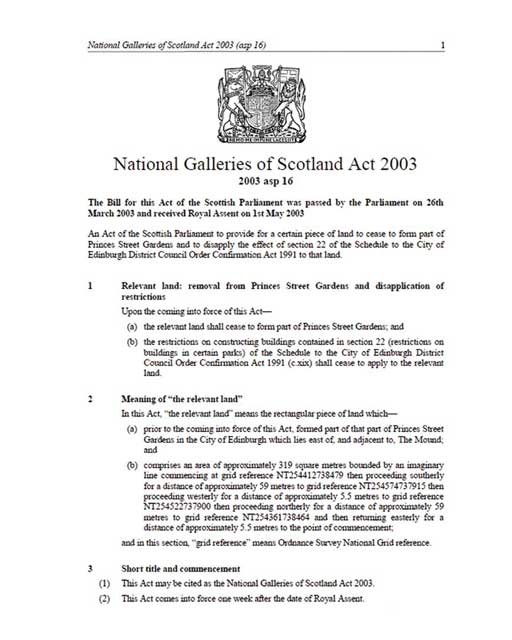2.2 Structure of an Act of the Scottish Parliament
Having considered the promoters' memorandum and explanatory note Activity 3 requires you to read the Act and answer a number of questions in relation to that Act.
Activity 3 Structure and commencement
Read through the National Galleries of Scotland Act 2003 in Figure 5 below and answer the following questions.
- How is the Act to be cited and where is this information found?
Comment
Section 3(1) states that the Act to be cited as the National Galleries Scotland Act 2003.
- When did the Act come into force? I.e. when did it become law?
Comment
The Act came into force on 8 May 2003. This was one week after 1 May 2003, the date of Royal Assent. This information could be found in Section 3 (2).
- How many sections does the Act have?
Comment
The Act has three Sections.
- What does the Act do?
Comment
The Act provides for a ‘certain piece of land to cease to form part of Princes Street Gardens and to disapply the effect of Section 22 of the Schedule to the City of Edinburgh District Council Order Confirmation Act 1991 to that land’. Section 1 is designed to remove the restrictions and Section 2 specifies the piece of land to which the Act applies.
An explanatory note [Tip: hold Ctrl and click a link to open it in a new tab. (Hide tip)] accompanied the Act. You have not been asked to read this but you may wish to do so.
If you visit the National Gallery on the Mound in Edinburgh you will see the completed works which include a lecture theatre, café, improved access and a link between the buildings.

Through Activities 1-3 you became familiar with the documents which may accompany a Bill and the structure of an Act of the Scottish Parliament. Although the Scottish Parliament works to be as transparent and open as possible in its law making process there are limitations as the structure of Acts is determined by long standing historical precedent. Activity 4 asks you to consider and reflect on the process.
Activity 4 Reflection on reading an Act
Take a few moments to think about everything you have read. Reflect on the different types of document you have read, one of which contained a law. How approachable did you find the style of writing, layout and language used in the documents?
Comment
Some of the information you may have found approachable and interesting, some you may have found difficult in its use of technical or specialised terminology and some you will have found straightforward. However you approached the information you have been asked to read in this activity, you will have started to develop strategies to help you make sense of it.
Understanding an Act is not always easy without some guidance. This activity was presented in a number of stages to introduce the specialist terminology used, including sections, schedules, commencement and asp numbers. This was designed to make the task more approachable and to introduce you to, and build your confidence in, reading unfamiliar and technical material.
Some familiarity with the terminology and conventions (such as citation) used makes understanding an Act much easier.
Some reading strategies
Figure 6 contains a number of suggestions that you may find useful when reading.


